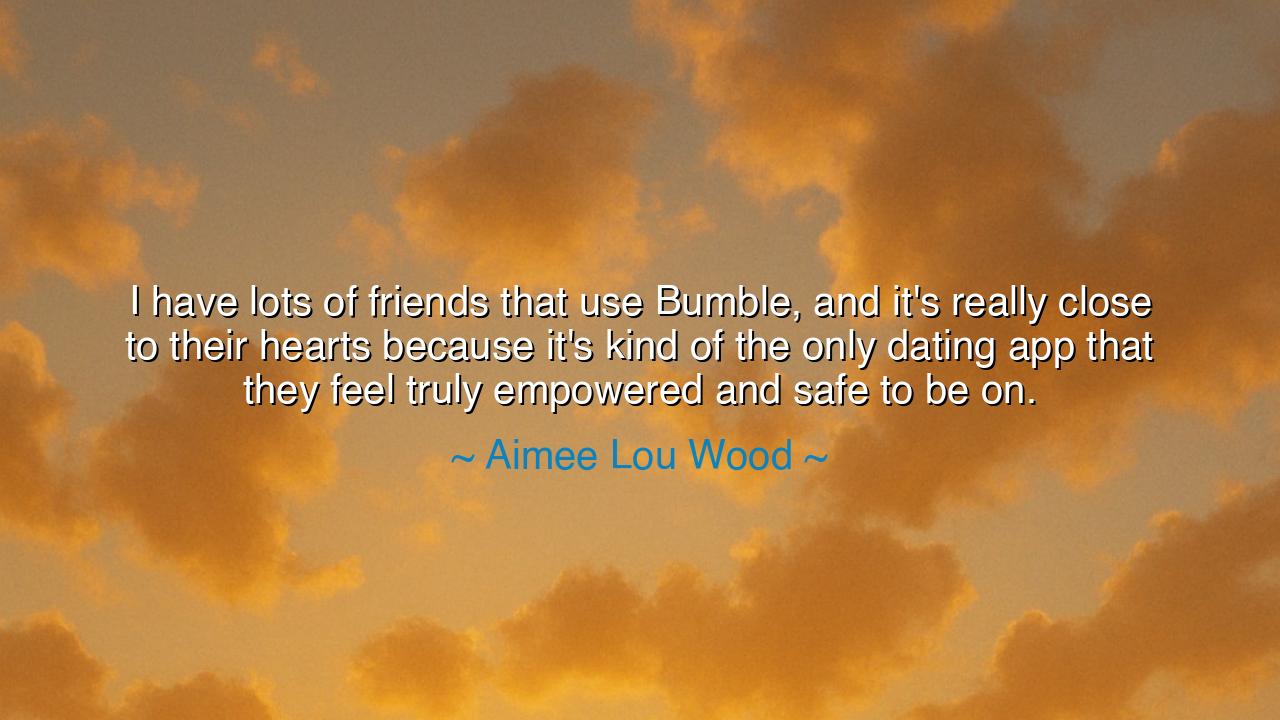
I have lots of friends that use Bumble, and it's really close to
I have lots of friends that use Bumble, and it's really close to their hearts because it's kind of the only dating app that they feel truly empowered and safe to be on.






“I have lots of friends that use Bumble, and it's really close to their hearts because it's kind of the only dating app that they feel truly empowered and safe to be on.” Thus spoke Aimee Lou Wood, an actress of the modern age, yet her words echo a timeless longing — the human desire for safety, dignity, and empowerment in the pursuit of love. Though she speaks of a digital invention, her wisdom stretches beyond technology. For at its core, her reflection is not about an app, but about the ancient struggle between vulnerability and fear — between the yearning to connect and the need to be protected while doing so.
To the ancients, love was never without peril. It was both the sweetest of gifts and the most dangerous of journeys. Poets warned that to open one’s heart is to risk being wounded, and philosophers taught that affection without respect soon becomes tyranny. In this light, Aimee Lou Wood’s praise of a space where love can flourish safely and freely is a renewal of an ancient dream — that love should never be born of fear, nor should one soul dominate another. Her words honor the idea that true intimacy begins not with conquest, but with mutual respect.
Bumble, the platform she speaks of, was born out of a rebellion — a desire to invert the patterns of old. Its creator, Whitney Wolfe Herd, sought to build a realm where women could initiate connection, where they could express desire without danger, and where love would be approached not as a game of power, but as a meeting of equals. This is what Wood calls “empowerment” — the restoration of agency to those who for too long have felt unheard in matters of the heart. Just as the priestesses of Delphi spoke with authority in the sacred temples of old, Bumble allows women to speak first — to choose, to discern, to define. It is not the end of courtship, but its evolution.
Throughout history, this yearning for balance between passion and safety has shaped entire civilizations. Consider the tale of Aspasia of Miletus, the famed philosopher and companion of Pericles in ancient Athens. She was a woman of wit and intellect, who dared to speak publicly in a world ruled by men. Her salon was a place where ideas and affection intertwined, where women could engage as thinkers and equals. But for her boldness, she faced scorn and accusation. Her story mirrors what Wood’s generation seeks to heal — the right for love and intellect, for strength and tenderness, to coexist. Bumble’s mission, in its modern way, carries forward that legacy — to create spaces where women may express affection without fear of ridicule, where equality is the foundation rather than the exception.
And yet, Wood’s insight carries another truth: that even in a world of progress, safety remains sacred. For love cannot blossom where fear is present. A heart under threat cannot open fully. Whether in the halls of ancient palaces or in the digital temples of today, the conditions of love must first be trust and security. Bumble’s promise, therefore, is not simply romance — it is sanctuary. It is a reminder that technology, when guided by empathy, can become an instrument of healing rather than harm.
But let no one mistake empowerment for separation. The goal is not to divide, but to harmonize — to allow both men and women to walk side by side as equals in the search for companionship. The power that Wood’s friends feel is not the power to control, but the power to choose, to define, to feel unafraid in revealing their hearts. It is a quiet, graceful power — the same strength found in the poets of old, who spoke their truths even when the world did not listen. True empowerment in love is not the loudness of domination, but the calm certainty of self-respect.
So, my children, take heed of Aimee Lou Wood’s reflection. Whether you seek love in the marketplace of hearts or in the silence of solitude, remember this: love thrives only where both souls feel safe to be seen. Create spaces, in your life and in the lives of others, where kindness replaces fear and respect replaces control. Let every encounter — whether fleeting or forever — be rooted in dignity.
For in the end, the wisdom of her words reaches far beyond the modern age. Love is not a battlefield; it is a bridge. And those who build it with compassion, equality, and humor will cross it with steadier hearts. As the ancients might have said: “The strongest bond between souls is not desire, but trust.” And to build that trust — whether through a digital platform or through one’s daily deeds — is the highest act of love.






AAdministratorAdministrator
Welcome, honored guests. Please leave a comment, we will respond soon